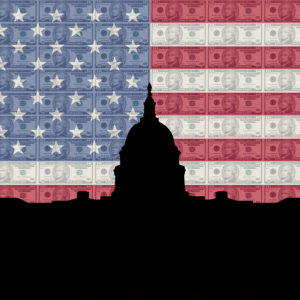Former Republican congressman Jason Chaffetz’s new book, “Power Grab: The Liberal Scheme to Undermine Trump, the GOP, and Our Republic,” claims that liberals channel more dark money than conservatives do, but campaign finance reform experts and the data suggest the story is much more complicated.
Brendan Fischer, director of federal reform at the Campaign Legal Center, a nonprofit dedicated to reducing the influence of money in politics, told InsideSources that “dark money” refers to money spent to support political candidates or ballot issues that’s not publicly disclosed.
Common Cause’s Director of Money in Politics & Ethics, Beth Rotman, told InsideSources that “dark money” is “political spending where the sources of funds are undisclosed.”
The Supreme Court 010 decision in Citizens United v. FEC allows corporations, nonprofits, and unions to spend an unlimited amount of money on elections and political issues without publicly disclosing the donors or other funding sources. Some conservatives, like Senate Majority Leader Mitch McConnell (R-Ky.), praised the decision as protecting corporations’ right to free speech.
According to Issue One, a nonpartisan group that employs Republicans and Democrats seeking to reduce the influence of money in politics, liberal dark money groups surpassed conservative dark money groups in spending for the first time during 2018 election cycle, when liberal groups constituted 54 percent of all dark money spending and conservative groups constituted 31 percent.
Up until that point, conservative dark money groups constituted at least 70 percent of all dark money spending every election cycle since Citizens United.
Issue One reported that the top liberal dark money spender during the 2018 election cycle was Majority Forward, a Super PAC that establishment Democrats are using to criticize the White House and Republicans.
A month before 2018 midterms in Alabama, a super PAC called Highway 31 popped up to funnel millions of dollars to Democratic candidate Doug Jones’ campaign, who ended up winning the U.S. Senate seat.
Despite both the right and left’s usage of dark money, American voters dislike the process, and some lawmakers want to bring more transparency to campaign finance.
According to a variety of polls from the Associated Press/University of Chicago Center for Public Affairs Research, The New York Times and the Center for Public Integrity/Ipsos, both Democrat and Republican voters believe the wealthy disproportionately affect elections with their donations and that there should be more campaign finance disclosures, and laws to increase campaign finance transparency.
The CPI/Ipsos poll, conducted in February 2019, also found that “when Americans think of elections, they place a great deal of emphasis on the influence of money. Sixty-five percent of Americans believe that politicians need a lot of money to win elections and even more (85%) believe that elected officials return favors for those who contribute greatly to their campaigns.”
In January, Reps. Kathleen Rice (D-N.Y.), Mike Gallagher (R-Wis.) and Derek Kilmer (D-Wash.) reintroduced the Political Accountability and Transparency Act (H.R. 679), which would require organizations to disclose top donors in their ads and prohibit the personal use of PAC funds.
Other conservatives, like Sen. Ted Cruz (R-Texas), want to limit the influence of money in politics even more. In a viral Twitter exchange with progressive Rep. Alexandria Ocasio-Cortez (D-N.Y.) in May, the pair agreed to write a bill together that would permanently ban lawmakers from becoming lobbyists once they leave office.
Neither Cruz nor Ocasio-Cortez returned InsideSources’ request for comment.
The term “dark money” is also used to refer to nonprofit spending on public policy initiatives that have nothing to do with elections, even though that’s not the proper definition or use of the term according to the nonpartisan nonprofits that track political spending.
“Often ‘dark money’ is used more broadly to mean any funding for a politically involved organization that is not publicly disclosed, and that term can be a little bit looser, because it can include charities and nonprofits that are not involved in elections and not necessarily trying to get involved in elections by keeping donors secret but instead by working on various causes, like immigration or criminal justice reform or technology policy or privacy policy or trade policy,” Fischer said.
In a recent Wall Street Journal column, Kimberly Strassel wrote about liberal activists and nonprofits funding public policy initiatives. Strassel cites a report from the Capital Research Center about how progressive nonprofits outspend conservative ones.
Beth Rotman, Director of Money in Politics & Ethics for Common Cause, said most Americans don’t know who is funding what, and why. Groups like CPI, the National Institute on Money in Politics, the Center for Responsive Politics and the Capital Research Center are working to build bigger databases tracking funding and donors to charities and nonprofits that educate or advocate about various public policy initiatives.
“I really see it as a situation where wealthy donors and ‘moneyed interests’ across the political spectrum drown out the voices of everyday Americans,” Rotman told InsideSources in an email.

